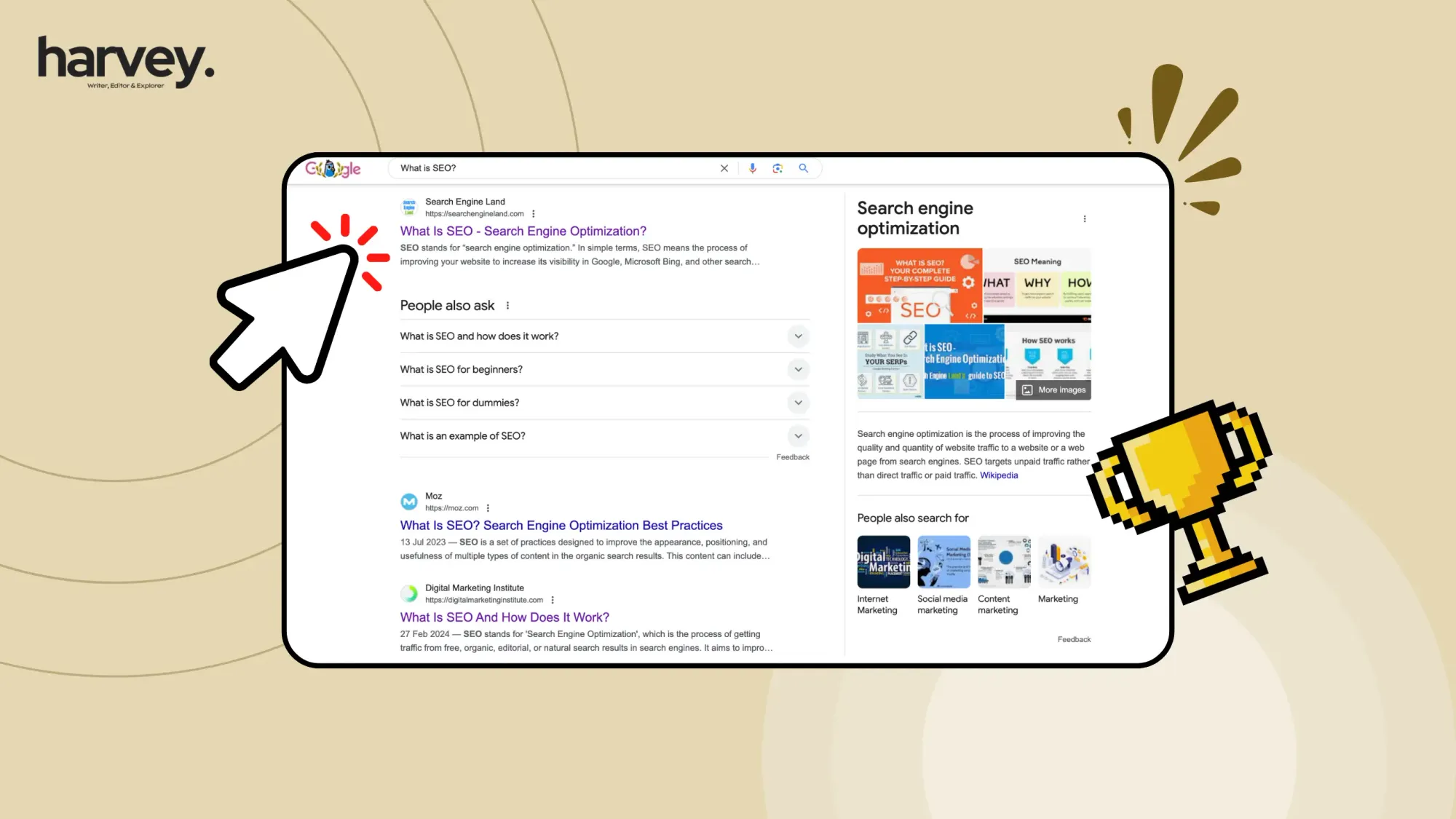What is SEO? The simplest explanation for newbies!
Discover SEO in the simplest terms! Forget the lengthy, technical jargon—this concise guide breaks down SEO basics for beginners. Perfect for those just starting out!

Search “What is SEO?” online, and you’ll find countless articles filled with jargon and complex details. For a beginner, it can be overwhelming and hard to digest.
If you're like me and prefer a simpler, more straightforward explanation, you're in the right place. I will help you understand SEO in a way that’s as easy as possible—perfect for anyone, even if you’re just 10 years old!
What is SEO?
SEO stands for Search Engine Optimisation. In simple terms, it’s the process of making sure Google (and other search engines) understand what your website is about and rank it high in search results. At the same time, SEO ensures that your content speaks directly to what people are searching for, encouraging them to click on your page.
The result? You attract a lot of organic traffic to your site without spending a dime—though it does require effort and time.
If you're curious and want to dig deeper, here’s the "Hierarchy of SEO Needs" below, which breaks down the essential tasks involved in SEO.

Why business need SEO?
As mentioned above, the primary goal of SEO is to make your webpage so "good" that people can easily find and click on it. But how does that benefit a business?
Increased Visibility
The higher your webpage ranks on Search Engine Results Pages (SERPs), the more likely people are to see your brand. If you’re on the first page of Google, your chances of getting noticed are significantly higher. In fact, a study by Chitika Insights found that 91.5% of Google traffic stays on the first page, while only 4.8% of users bother to click through to the second page.
Enhanced Authority
A high-ranking page is often perceived as more credible and trustworthy. Research by Backlinko shows that the #1 result on Google gets 27.6% of all clicks. As you drop lower in the rankings, the click-through rate (CTR) decreases sharply.

Driving Potential Customers
When someone clicks on your page, you've successfully reached a potential customer and drawn them into the first step of the customer journey. This is why businesses invest in SEO: to attract, engage, and convert users who are actively searching for what they offer.
The 3 key pillars of SEO
SEO is a ever-changing game, with each update from the platform, the rules slight changed, and we have to make corresponding adjustment. But its key principles always stay the same. We can break SEO into three core components or pillars that you need to be familiar with – and action regularly:
Technical SEO
As the name suggests, this pillar focuses on the "behind-the-scenes" aspects of your website. The goal here is to ensure that your website is built on a solid foundation, which makes it easy for search engines to crawl and index your content. Think of it like the quality leather in a luxury handbag—it's what makes your website durable and reliable.
Key technical optimisations include:
- Page Speed: Ensuring your website loads quickly.
- Security: Implementing HTTPS to protect user data.
- Site Structure: Organising your website so that search engines can easily understand and navigate it.
On-page SEO
On-Page SEO involves optimizing individual pages on your website to make them more relevant to search queries and more engaging for users. This is what most people mean when they talk about SEO and often the aspect that content creators focus on the most.
On-Page SEO is all about ensuring that every element on your webpage, from the content to the images to the meta tags, is optimised to attract and satisfy both users and search engines. Some key elements on your page may include: URL, Title, Meta Description, Headers, Images, …
Off-page SEO
Off-Page SEO refers to activities outside your website that impact your site’s rankings within search engine results pages (SERPs). While On-Page SEO focuses on optimising elements on your site, Off-Page SEO is about building your website’s authority and reputation across the web. The stronger your site’s reputation, the higher it will rank. Some off-page SEO tactics are:
- Building Backlinks: Earning links from other reputable websites, which signals to Google that your site is trustworthy.
- Content Repurposing: Sharing your content across multiple platforms to reach a wider audience.
- Public Relations: Engaging in activities that build your brand's reputation online.
Step up your SEO game
Still unsure about what SEO is? Or maybe you have some unique questions? Don't hesitate to reach out! Curiosity is the key to learning, so feel free to contact me anytime. I’m here to help and would love to have a conversation with you.
